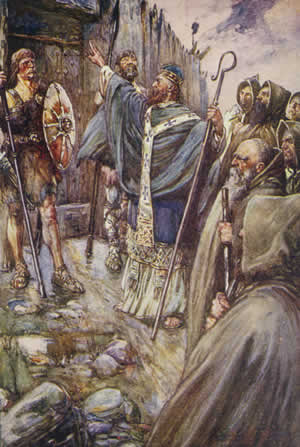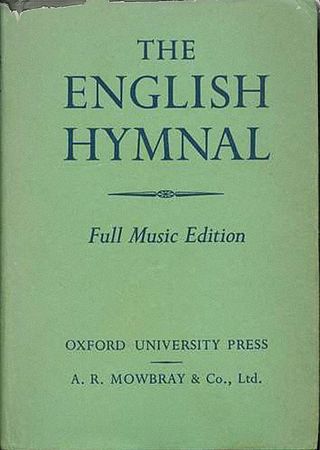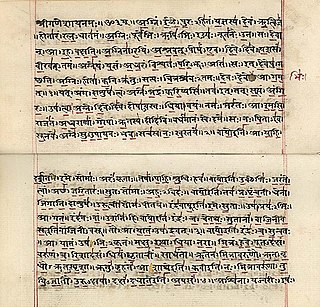Related Research Articles

Columba or Colmcille was an Irish abbot and missionary evangelist credited with spreading Christianity in what is today Scotland at the start of the Hiberno-Scottish mission. He founded the important abbey on Iona, which became a dominant religious and political institution in the region for centuries. He is the patron saint of Derry. He was highly regarded by both the Gaels of Dál Riata and the Picts, and is remembered today as a Catholic saint and one of the Twelve Apostles of Ireland.

A hymn is a type of song, and partially synonymous with devotional song, specifically written for the purpose of adoration or prayer, and typically addressed to a deity or deities, or to a prominent figure or personification. The word hymn derives from Greek ὕμνος (hymnos), which means "a song of praise". A writer of hymns is known as a hymnist. The singing or composition of hymns is called hymnody. Collections of hymns are known as hymnals or hymn books. Hymns may or may not include instrumental accompaniment.

Charles Wesley was an English leader of the Methodist movement. Wesley was a prolific hymnwriter who wrote over 6,500 hymns during his lifetime. His works include "And Can It Be", "Christ the Lord Is Risen Today", "Love Divine, All Loves Excelling", the carol "Hark! The Herald Angels Sing", and "Lo! He Comes With Clouds Descending".

An abecedarium is an inscription consisting of the letters of an alphabet, almost always listed in order. Typically, abecedaria are practice exercises.
Hiberno-Latin, also called Hisperic Latin, was a learned style of literary Latin first used and subsequently spread by Irish monks during the period from the sixth century to the tenth century.

Abecedarians were a 16th-century German sect of Anabaptists who rejected all human learning. Questions have been raised as to the historical accuracy of the name and sect, though the term was applied broadly to the Zwickau Prophets.

Sedulius was a Christian poet of the first half of the 5th century.

The English Hymnal is a hymn book which was published in 1906 for the Church of England by Oxford University Press. It was edited by the clergyman and writer Percy Dearmer and the composer and music historian Ralph Vaughan Williams, and was a significant publication in the history of Anglican church music.

Noye's Fludde is a one-act opera by the British composer Benjamin Britten, intended primarily for amateur performers, particularly children. First performed on 18 June 1958 at that year's Aldeburgh Festival, it is based on the 15th-century Chester "mystery" or "miracle" play which recounts the Old Testament story of Noah's Ark. Britten specified that the opera should be staged in churches or large halls, not in a theatre.
The Carolina Abecedarian Project was a controlled experiment that was conducted in 1972 in North Carolina, United States, by the Frank Porter Graham Child Development Institute to study the potential benefits of early childhood education for poor children to enhance school readiness. It has been found that in their earliest school years, poor children lag behind others, suggesting they were ill-prepared for schooling. The Abecedarian project was inspired by the fact that few other early childhood programs could provide a sufficiently well-controlled environment to determine the effectiveness of early childhood training.

Saint Patrick was a fifth-century Romano-British Christian missionary and bishop in Ireland. Known as the "Apostle of Ireland", he is the primary patron saint of Ireland, the other patron saints being Brigid of Kildare and Columba. Patrick was never formally canonised, having lived before the current laws of the Catholic Church in these matters. Nevertheless, he is venerated as a saint in the Catholic Church, the Lutheran Church, the Church of Ireland, and in the Eastern Orthodox Church, where he is regarded as equal-to-the-apostles and Enlightener of Ireland.

"Oh Happy Day" is a 1967 gospel music arrangement of the 1755 hymn by clergyman Philip Doddridge. Recorded by the Edwin Hawkins Singers, it became an international hit in 1969, reaching No. 4 on the US Singles Chart, No. 1 in France, Germany, and the Netherlands and No. 2 on the Canadian Singles Chart, UK Singles Chart, and Irish Singles Chart. It has since become a gospel music standard.
An abecedarius is a special type of acrostic in which the first letter of every word, strophe or verse follows the order of the letters in the alphabet.
"Saint Patrick's Breastplate" is an Old Irish prayer of protection of the "lorica" type attributed to Saint Patrick.
Events from the year 1827 in Ireland.

Events from the year 1848 in Ireland.
Compensatory education offers supplementary programs or services designed to help children at risk of cognitive impairment and low educational achievement succeed.

The Rigveda or Rig Veda is an ancient Indian collection of Vedic Sanskrit hymns (sūktas). It is one of the four sacred canonical Hindu texts (śruti) known as the Vedas. Only one Shakha of the many survive today, namely the Śakalya Shakha. Much of the contents contained in the remaining Shakhas are now lost or are not available in the public forum.
Abecedarian is a 16th-century German sect that rejected any education above the minimal level.
Apparebit repentina is an anonymous abecedarian Latin hymn on the Day of Judgement. Since it is mentioned by Bede, it is believed to date to the 7th century or earlier.
References
- ↑ Brewer, E. Cobham (1894). The Dictionary of Phrase and Fable (1978 ed.). Edwinstowe, England: Avenel Books. p. 3. ISBN 0-517-25921-4.
- ↑ "Celtic Breviary Vol 3" . Retrieved 2008-10-30.
- ↑ Duffield, Samuel Willoughby. The Latin Hymn-writers and Their Hymns. ISBN 9780790554631 . Retrieved 2008-10-30.
- ↑ "Irish Music from the 6th to the 9th Century". Archived from the original on 26 October 2008. Retrieved 2008-10-30.
- ↑ Follett, Westley (2006). Céli Dé in Ireland. ISBN 9781843832768 . Retrieved 2008-10-30.